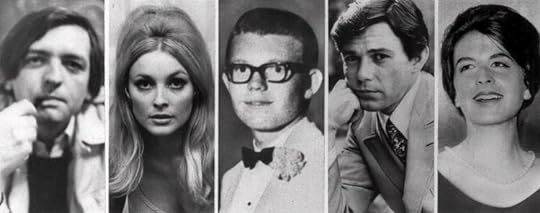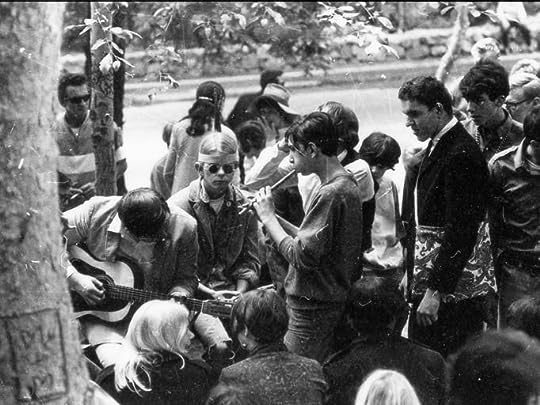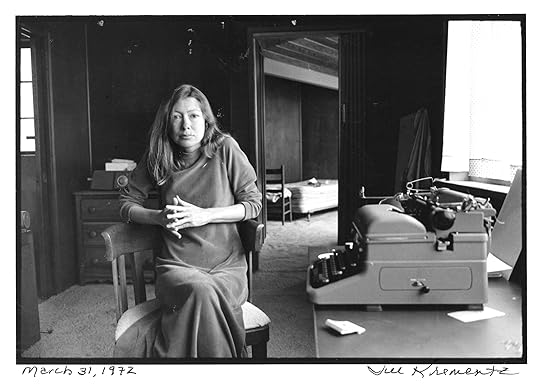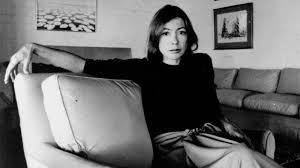What do you think?
Rate this book


238 pages, Paperback
First published January 1, 1968
". . . time past is not believed to have any bearing on time present or future, out in the golden land where every day the world is born anew."

This is the California where it is easy to Dial-A-Devotion, but hard to buy a book. This is the country in which a belief in the literal interpretation of Genesis has slipped imperceptibly into a belief in the literal interpretation of Double Indemnity, the country of the teased hair and the Capris and the girls for whom all life's promise comes down to a waltz-length white wedding dress and the birth of a Kimberly or a Sherry or a Debbi and a Tijuana divorce and return to hairdressers' school. “We were just crazy kids” they say without regret, and look to the future. The future always looks good in the golden land, because no one remembers the past. Here is where the hot wind blows and the old ways do not seem relevant, where the divorce rate is double the national average and where one person in every thirty-eight lives in a trailer.
Here is the last stop for all those who come from somewhere else, for all those who drifted away from the cold and the past and the old ways. Here is where they are trying to find a new life style, trying to find it in the only places they know to look: the movies and the newspapers.








"To have that sense of one's intrinsic worth which constitutes self-respect is potentially to have everything: the ability to discriminate, to love and to remain indifferent. To lack it is to be locked within oneself, paradoxically incapable of either love or indifference."
The impulse to write things down is a peculiarly compulsive one, inexplicable to those who do not share it, useful only accidentally, only secondarily, in the way that any compulsion tries to justify itself.
The roles assigned to her are various, but variations on a single theme. She is the Madonna of the disaffected. She is the pawn of the protest movement. She is the unhappy analysand. She is the singer who would not train her voice, the rebel who drives the Jaguar too fast, the Rima who hides with the birds and the deer. Above all, she is the girl who 'feels' things, who has hung on to the freshness and pain of adolescence, the girl ever wounded, ever young.

one of the mixed blessings of being twenty and twenty-one and even twenty-three is the conviction that nothing like this, all evidence to the contrary notwithstanding, has ever happened before.As a twenty-three year old (recently initiated, adieu, twenty-two) I understand the conviction that what one feels, one is the first to feel, perhaps the only one ever to feel: all emotions feel unique, curried with the salt of freedom. If young childhood is the realm of dominant solipsism, young adult hood is the era of narcissism, egoism. It is necessary, I think, to go through this deeply narcissistic phase: we must, at sometime, be the true heroes of our life stories: alone and valiant like Odysseus. At twenty-something, the consequences of our actions are minor, we are yet-formed, yet-completed, we are free to fall and free to rise, but still free to be forgiven. In this period of our lives we must design and build a genuine ego, to replace the mask of entitlement and privilege of youth. Everything which is new is new only by our point of reference: ourselves, and impossible to conceive the true universality of it in the present. Literature, history, makes us feel often that we are not alone, that what we are feeling is rooted in something which is universal, eternal: but we still believe that we have a unique strain, an undiscovered permutation of the human condition.
I know something about dread myself, and appreciate the elaborate systems with which some people fill the void, appreciate all the opiates of the people, whether they are as accessible as alcohol and heroin and promiscuity or as hard to come by as faith in God or History.As humans, we need some escape, or if not escape overtly, some structure which guards us from the brutal chaos of reality. We conceive of ourselves heroes, we are heroically justified, our self-respect buds, we become a solitary wanderer, discoverer, thinker, inventor: we measure ourselves by our potential, not necessarily by our accomplishments.
To have that sense of one's intrinsic worth which constitutes self-respect is potentially to have everything: the ability to discriminate, to love and to remain indifferent. To lack it is to be locked within oneself, paradoxically incapable of either love or indifference.Self-respect, according to Didion, is a "moral nerve" - those with self-respect "have the courage of their mistakes. They know the price of things." It is in the golden era of our lives, our twenties, when we are forced to pay for things: our material needs with money, and our mistakes with our self-respect. There is not currency so valuable as self-respect, and no wealth which is harder to regain when it has been lost.
I think we are well-advised to keep on nodding terms with the people we used to be, whether we find them attractive company or not. Otherwise they turn up unannounced and surprise us, come hammering on the mind's door at 4 a.m. of a bad night and demand to know who deserted them, who betrayed them, who is going to make amends. We forget all too soon the things we thought we could never forget. We forget the loves and the betrayals alike, forget what we whispered and what we screamed, forget who we were.

"My only advantage as a reporter is that I am so physically small, so temperamentally unobtrusive, and so neurotically inarticulate that people tend to forget that my presence runs counter to their best interests. And it always does. That is one last thing to remember: writers are always selling somebody out."
"In fact that is what it is like to come from a place like Sacramento. If I could make you understand that, I could make you understand California and perhaps something else besides, for Sacramento is California, and California is a place in which a boom mentality and a sense of Chekhovian loss meet in uneasy suspension; in which the mind is troubled by some buried but ineradicable suspicion that things had better work here, because here, beneath that immense bleached sky, is where we run out of continent."
"Turning and turning in the widening gyre
The falcon cannot hear the falconer;
Things fall apart; the center cannot hold;
Mere anarchy is loosed upon the world,
The blood-dimmed tide is loosed, and everywhere
The ceremony of innocence is drowned;
The best lack all conviction, while the worst
Are full of passionate intensity.
Surely some revelation is at hand;
Surely the Second Coming is at hand.
The Second Coming! Hardly are those words out
When a vast image out of Spiritus Mundi
Troubles my sight: somewhere in the sands of the desert
A shape with lion body and the head of a man,
A gaze blank and pitiless as the sun,
Is moving its slow thighs, while all about it
Reel shadows of the indignant desert birds.
The darkness drops again; but now I know
That twenty centuries of stony sleep
Were vexed to nightmare by a rocking cradle,
And what rough beast, its hour come round at last,
Slouches towards Bethlehem to be born?"